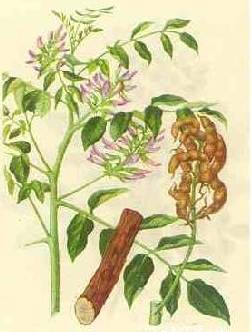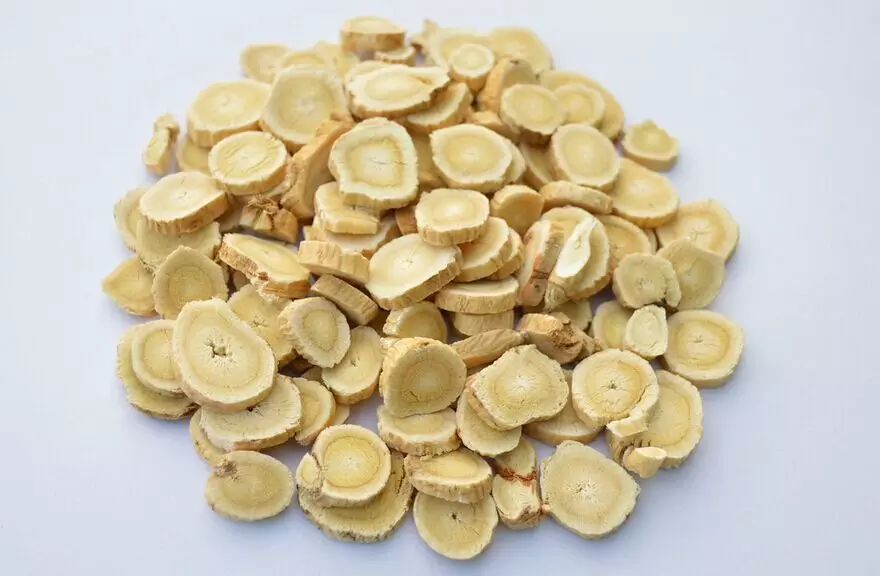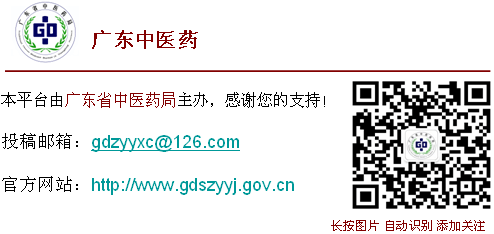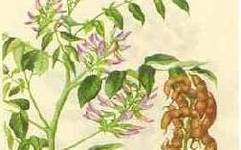Astragalus
Latin name: Astragalus membranaceus (Fisch.) Bunge, also known as Huang Qi, Wang Sun, Bai Yao Mian, and Jian Qi, is a perennial herbaceous plant of the legume family. The plant is found in Inner Mongolia, Shanxi, Gansu, Heilongjiang, and other regions, and is a nationally protected species. The medicinal material Huang Qi is derived from the roots of the Mongolian Astragalus and the membranous pod Astragalus.

【Properties and Channels】
According to Traditional Chinese Medicine (TCM), Huang Qi has a sweet flavor, a slightly warm nature, and is associated with the Spleen and Lung meridians. The medicinal part is its dried root, which has functions of tonifying Qi, stopping sweating, promoting urination and reducing swelling, and detoxifying to promote tissue regeneration. The Ben Cao Gang Mu states, “Qi means long; Huang Qi is yellow, and is the foremost tonic herb, hence the name,” making it an important Qi-tonifying herb in clinical practice.
【Medicinal Effects】
1. Nutrient-Rich
Huang Qi contains saponins, sucrose, polysaccharides, various amino acids, folic acid, and trace elements such as selenium, zinc, and copper.
2. Immune Enhancement
Huang Qi is one of the fundamental herbs in TCM used to enhance the immune capacity of the lungs and respiratory system, and can be used for conditions like spontaneous sweating due to low immunity.
3. Qi Tonification and Spleen Strengthening
Huang Qi is known for its Qi tonifying properties. Symptoms such as fatigue in speech, weakness in walking, and pale complexion are manifestations of Spleen and Lung Qi deficiency. Huang Qi can tonify Qi throughout the body, whether it is upper or lower body Qi deficiency.
4. Qi Nourishment and Surface Stabilization
Raw Huang Qi has the effects of nourishing Qi, stabilizing the exterior, promoting urination and reducing swelling, detoxifying, and promoting tissue regeneration. It is suitable for conditions like spontaneous sweating, night sweats, blood stasis, edema, and abscesses that do not heal or take a long time to heal. Honey-fried Huang Qi has the effects of tonifying Qi, nourishing blood, and benefiting the middle, suitable for internal injuries, fatigue, Spleen deficiency diarrhea, Qi deficiency, blood deficiency, and Qi decline.
5. Heart Protection
Huang Qi can lower blood viscosity, reduce thrombosis, lower blood pressure, protect the heart, regulate blood sugar in both directions, resist free radical damage, combat aging, resist hypoxia, combat tumors, and enhance the body’s immunity. It can be used to treat heart disease, hypertension, diabetes, etc. Huang Qi can also dilate blood vessels, improve skin blood circulation and nutritional status, making it effective for chronic ulcers that do not heal. It can eliminate proteinuria in patients with nephritis, protect the liver, and prevent the reduction of liver glycogen.

【Culinary Effects】
Huang Qi is a commonly consumed herbal medicine among the public, and there is a saying that “drinking Huang Qi soup regularly prevents disease and maintains health,” meaning that frequently using Huang Qi with Qiong Zhen Ling Zhi to make soup or brew tea has good preventive health effects.
Both Huang Qi and Ginseng are excellent Qi tonics; Ginseng focuses on greatly tonifying the original Qi, reviving Yang, and is often used for emergencies like collapse or shock, showing better effects. Huang Qi, on the other hand, primarily tonifies deficiency and is often used for prolonged weakness, low speech, and weak pulse. Some people are prone to colds with weather changes, which TCM refers to as “unconsolidated exterior,” and Huang Qi can be used to stabilize the exterior, helping to avoid frequent colds when taken regularly.
When selecting Huang Qi, choose those that are dry, thick, have few wrinkles, sufficient powdery texture, firm yet soft, not easily broken, sweet in taste, and free from black hearts or hollowness.
【Recommended Medicinal Dishes】
1. Sand Ginger Huang Qi Pig Stomach
Ingredients: 6g Sand Ginger, 20g Huang Qi, 1 Pig Stomach.
Method: Clean the pig stomach, stuff it with Sand Ginger and Huang Qi, add water, and stew until cooked, then season to taste.
Effects: Tonifies Qi and strengthens the Spleen, aids digestion, and opens the appetite. Suitable for those with Spleen and Stomach weakness, poor appetite, and abdominal pain. Can be used for patients with gastric prolapse and chronic gastritis.
Pharmacology: Sand Ginger can move Qi and harmonize the stomach, awaken the Spleen, and is used for food stagnation. Clinically, appropriate use of Sand Ginger promotes the secretion of digestive juices and enhances gastrointestinal motility. Pig stomach can strengthen the Spleen and Stomach and replenish deficiencies.
2. Huang Qi Neijin Porridge
Ingredients: 12g Raw Huang Qi, 10g each of Raw Coix Seed and Red Bean, 7g Chicken Inner Gold Powder, 1 Kumquat Cake, 80g Glutinous Rice.
Method: Boil Raw Huang Qi in water for 20 minutes, strain the juice, add Coix Seed, Red Bean, and Glutinous Rice to cook into porridge, then add Chicken Inner Gold Powder.
Effects: Aids digestion and harmonizes the stomach. Suitable for symptoms of abdominal distension, poor appetite, fatigue, and loose stools due to Spleen deficiency and damp stagnation.
Pharmacology: Huang Qi can tonify Qi and stabilize the exterior, promote wound healing and tissue regeneration. Coix Seed strengthens the Spleen and drains dampness, alleviating diarrhea. Red Bean can promote urination and reduce jaundice, clearing heat and detoxifying. Chicken Inner Gold aids digestion and strengthens the Spleen, increasing gastric juice secretion and acidity, enhancing gastric motility and accelerating emptying. Glutinous Rice can tonify the middle and benefit Qi.


